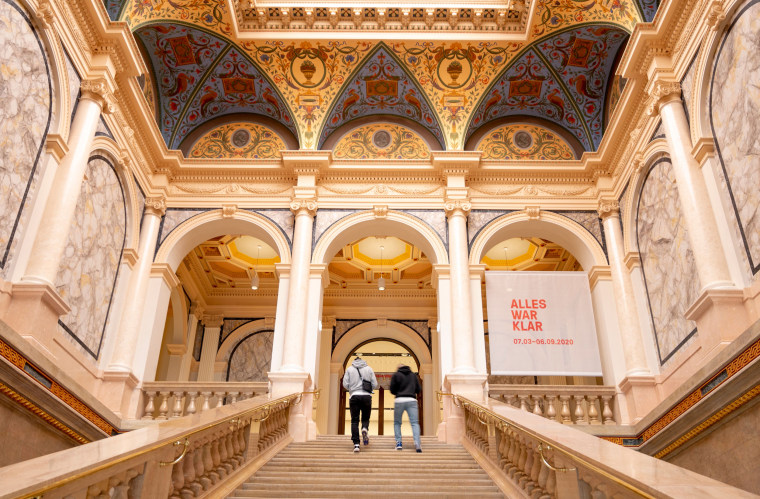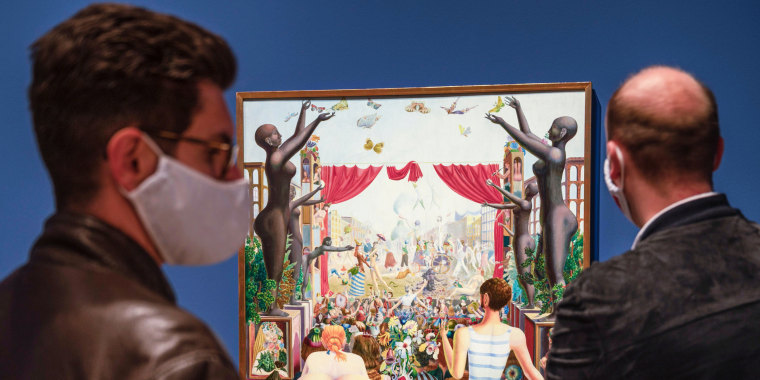After having gotten content strikes from Facebook, Instagram and TikTok for posting artwork depicting nudity, the Vienna Tourist Board is turning to OnlyFans to highlight the explicit works of art on display in the city’s museums.
On its OnlyFans account, the city's tourism board freely posts images of artwork by Egon Schiele, Richard Gerstl, Koloman Moser and Amedeo Modigliani — whose paintings conventional social media sites had labeled as inappropriate and “pornographic.”
OnlyFans is known for allowing creators to post sexually explicit content for their paying subscribers, and early subscribers to ViennaTouristBoard are eligible for a city transportation card or a free ticket to view the works “in the flesh” at one of the city’s museums, according to the tourism board.
In a statement on its website, the tourism board said the city has been home to artists “whose works pushed the boundaries of what was considered acceptable in art and society at the time.”
The art that was censored over 100 years ago continues to be censored online as social media platforms crack down on explicit content, according to the site.

“And the battle against censorship still rages on: with the rise of social media, bans like these are back in headlines once again,” the statement continues. “Major social media channels like Instagram and Facebook have nudity and ‘lewd’ content firmly in their sights.”
Helena Hartlauer, a spokesperson for the Vienna Tourist Board, told NBC News that social media was an especially important tool for museums to continue displaying art while adhering to social distancing guidelines. But social media accounts for some Austrian museums, such as the Albertina and the Leopold Museum, have been flagged or suspended for posting artwork containing nudity.
The Albertina was suspended from TikTok in July, and later banned, for posting videos featuring the works of the artist and photographer Nobuyoshi Araki, whose subjects were often nude women.
Instagram’s content policy says “nudity in photos of paintings and sculptures” are allowed, but in 2019 the platform flagged the museum’s post featuring a painting by Peter Paul Rubens as a community violation.
In 2018, Vienna’s Natural History Museum posted an image of the prehistoric Venus of Willendorf figurine, which may have symbolized motherhood or fertility. Facebook deemed the post pornographic and removed it. In September, the platform also flagged the Leopold Museum’s post featuring a painting by Moser as “potentially pornographic.”
"Right now, an algorithm determines what is okay to see and what is not," Hartlauer said. "And it definitely should not determine our cultural legacy."
She said she worries that social media platforms' strict policies may encourage artists to censor their creative expression in order to promote their work online without getting banned.
Spokespeople for TikTok and Facebook, which owns Instagram, didn’t immediately respond to requests for comment.
Hartlauer said it's “almost impossible” for the museums to use nude artwork in any promotional materials.
An exhibition at the Albertina featuring Modigliani, for example, is difficult to promote because of the explicit nature of Modigliani’s work. The tourism board faced challenges trying to promote its OnlyFans account on Twitter, Facebook and Instagram.
“It is an irony,” Hartlauer said. “It’s really just shown us that this is the right time ... and the right issue to address.”
She said OnlyFans “finally” provides “a way to show these things.”
The tourism website wrote in its statement that “OnlyFans shook up social media by giving creators a platform where they could freely share nude and pornographic content with subscribers.”
The platform didn’t immediately respond to a request for comment about the tourism board’s decision.
Although OnlyFans is credited with pioneering a sex-positive social media platform, the company has waffled on continuing to allow sexually explicit content. In August, OnlyFans said it planned to phase out sexually explicit content in response to requests from financial institutions. The site said it would continue to allow nudity, but it didn’t clarify the difference between nudity and sexually explicit content.
Following backlash from creators and subscribers, OnlyFans backtracked and said it wouldn’t change its policy allowing sexually explicit content in “support” of its “diverse creator community.”
“OnlyFans stands for inclusion and we will continue to provide a home for all creators,” the platform tweeted.
Vienna’s move to OnlyFans is an effort to promote tourism to the city as travel restrictions ease worldwide. But it also is meant to raise awareness of the modern censorship of art, Hartlauer said.
She added that the marketing initiative of joining OnlyFans is "not the ultimate solution for this problematic relationship between the art world and social media," but a way to make a statement.
"We've decided to try to start a conversation about this topic because we thought it's very Vienna," she said. "Because Vienna has always been a very open minded city. We believe it's important for Vienna institutions in general to have some space for different ideas, and we're not afraid of the naked truth.
